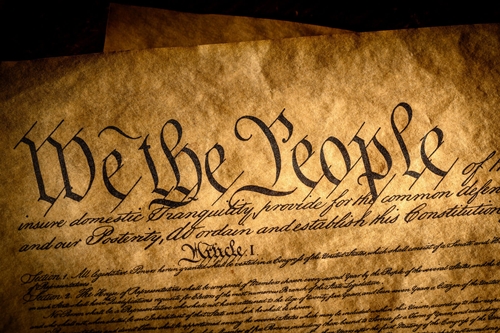On January 20, 2017, and again on January 20, 2025, Donald Trump raised his right hand and swore the Presidential oath of office. Presumably, he understood what he was committing to. Yet, on Sunday (May 4), Kristen Welker of NBC asked him directly:
“Don’t you need to uphold the Constitution of the United States as president?”
His answer? “I don’t know.”
Considering his actions during his first term and the early months of this one, it’s hardly surprising that he feigned ignorance. But here’s what he should know and what we must keep front and center in our minds.
The presidential oath of office is more than a formality. It’s a cornerstone of American democracy. Found in Article II, Section 1, Clause 8 of the U.S. Constitution, it mandates that every president swear to “preserve, protect, and defend the Constitution of the United States.” This is not an empty ritual; it’s a binding pledge that affirms their duty to uphold the nation’s founding principles.
Beyond its legal necessity, the oath is rooted in a social contract, a mutual agreement between the government and the people. We entrust our leaders with power, expecting them to protect rights, honor democratic values, and govern with accountability. Leadership isn’t about unchecked authority. It’s about service.
By taking the Presidential Oath of Office, Trump’s obligation to the Constitution became explicit and non-negotiable. Every president’s authority comes from the Constitution, not personal discretion. The oath ensures continuity in democratic governance, prioritizing the rule of law over individual will, preventing power grabs, and safeguarding the balance between executive authority and constitutional limits.
By taking that solemn pledge, Trump acknowledged his responsibility to protect the freedoms of all Americans. His failure or reluctance to acknowledge his responsibility clearly demonstrates his lack of integrity and willingness to guarantee the stability of constitutional governance.
At the heart of democracy lies the social contract between the government and the people, a fundamental principle explored by John Locke and Jean-Jacques Rousseau. Their ideas shaped the understanding that governmental power isn’t inherent. It’s granted by the governed in exchange for the protection of rights and freedoms.
The U.S. Constitution serves as the formal framework of this agreement, ensuring lawful governance and accountability. The Preamble – “We the People of the United States…”– reminds us that sovereignty rests with the people, not the government. When a president questions his obligation to uphold the Constitution, (an obligation he agreed to when taking the Presidential oath of office), he risks breaking this contract, eroding trust, and weakening his own legitimacy.
A president’s commitment to the Constitution is not optional. It’s essential to the stability of our nation. When Trump openly casts doubt on his responsibility to uphold it, he signals his disregard for the rule of law.
History shows that leaders who ignore constitutional principles face consequences, whether through public outrage, congressional investigations, or legal challenges. We have already witnessed building political resistance, judicial intervention, and civil unrest in response to his actions. Ultimately, presidential duty is not discretionary. It’s the bedrock of governance. The Constitution exists to serve the people, and any leader who refuses to uphold it should be prepared to face whatever political consequences “We the people” deem appropriate.
